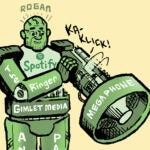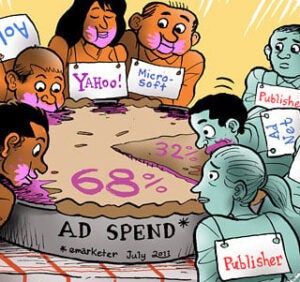MDC Partners CEO Scott Kauffman runs his agency network a bit differently than his peers.
While the agency founders’ culture has come under fire recently by some, Kauffman, who has been CEO at MDC since 2015, actively facilitates it. MDC takes a majority stake in agencies and lets its entrepreneurs drive their own growth rather than acquiring them outright.
“If you simply want to cash out and get a big payday, we’re never going to be that company,” he said. “We’re not interested on having our partners cash out on us.”
So, where other holding companies are trying to break down silos across agencies to collaborate around clients, MDC still believes that autonomous agencies can still collaborate while preserving their entrepreneurial cultures.
Kauffman argues that competitors’ focus on streamlining homogenizes talent and keeps them from focusing on the client.
Kauffman sat down with AdExchanger at Cannes Lions to discuss why his holding company model works and how his agencies are navigating a consolidating media landscape.
AdExchanger: How is MDC’s presence different in Cannes this year?
SCOTT KAUFFMAN: Unlike the traditional holding companies, I don’t mandate who comes. But MDC’s visibility is up a little because I’m speaking this year, and I didn’t last year.
For us, it’s important, particularly for our agencies, to feel confident that we believe that creativity is what drives this business. Cannes Lions has worked diligently to put more of the focus back on creativity, and that’s something we wholeheartedly support.
You’ve said publicly that MDC is not a holding company. What is it?
AdExchanger Daily
Get our editors’ roundup delivered to your inbox every weekday.
Daily Roundup
Structurally, we’re similar. I just refuse to use the term because it has the connotation of acting like one of the other six holding companies, which are top-down, monolithic and born of a different era.
Our agencies operate with a level of autonomy that I understand is not present in the traditional holding companies. We go to market as a collection of agencies who work together and complement each other’s skills, as opposed to being at war with one another for corporate resources or the affection of the parent company.
Holding companies struggle with silos that limit collaboration. How do you avoid that?
We don’t outright acquire agencies and run them like a spreadsheet. The founding teams hold onto a substantial share of the company, so they have a vested interest in continuing to grow. As entrepreneurs, that resonates.
Teams are rewarded on the success of their agency, not the success of colleagues, because they each run a separate independent P&L.
Doesn’t that make it harder to collaborate?
It certainly is not without its challenges. The price of autonomy is that more work has be done to coordinate and collect information. That’s the trade-off we’re willing to make.
How are you navigating a period when clients are cutting costs and agency growth is slowing?
Clients have always wanted more for less. Our challenge is to make sure we continue to deliver the services they need as efficiently as humanly possible.
We’ve centralized the data function inside of MDC, and we’re building one stack that all of our agencies can use. We created another agency called Zero and One, whose sole client base is other MDC agencies, so they don’t have to reinvent the wheel. That’s where a “holding company structure” makes sense.
You come from Silicon Valley. What lessons from that world do you apply to running an agency group, which is a much more challenged category?
I’ve seen so many pendulum swings that I don’t get too hung up on the prognosticators. It never turns out that way. Six months ago, the consultancies were coming, and that’s just not happening. Or the transparency issues are going to destroy the media landscape, and that’s not happening. There are ebbs and flows to business.
It’s just as important to determine what you’re not going to do. In a resource constrained environment, that’s absolutely crucial. We have narrowed our focus. We have doubled down on creativity with an overlay of technology and data. That gives us a focus of what we want to buy and things that are of less interest to us. We sold a small business last year. We’d be open to more streamlining if it makes sense. That focus makes it easier to navigate choppy waters.
Consultancies are all over Cannes this year. You still don’t think of them as competition?
Oh, my goodness, no. I haven’t been to the harbor yet, but apparently there are a bunch of consultancy boats. It’s almost comical.
It’s not as if we’re not already doing strategy. They want to buy agencies to prove they’re in the agency business. We competed with those agencies when they were independent, and now we compete with them as part of a consultancy. My bet is we’ll continue to deliver our strategic services far more effectively than they will ever be able to deliver creative services. That’s an opinion held by many a CMO.
You also say transparency hasn’t been an issue. What’s the state of agency/client trust in the industry?
When we built our media operations, we understood the problems the rest of the industry was facing. We’re media-agnostic. We don’t make the majority of our money based on whether our clients spend on media. Ten percent of our revenue is associated with media planning and buying.
We can’t be beholden to any outcome, solution, platform or media channel, because the challenges that client is facing may dictate a different outcome or solution. Transparency issues are happening with agencies that have massive media arms and have been profiting enormously from the eyeball arbitrage that occurs when an agent becomes a principal. When your client doesn’t know, that’s where trust might break down. If you’re dependent on that revenue in order to meet your numbers, it’s very difficult to shut that down.
How do you approach a consolidating media landscape, and how will buying strategies change if more walled gardens emerge?
We’re customers of those gardens. They have to come down enough for us to spend our clients’ money. We have to pay attention and help our clients navigate it, but it is what it is.
I’ll use the same analogy I did with the consultancies buying agencies: CNN was there yesterday as part of one corporate entity, and it’s now part of another corporate entity. We’ll either advertise on it or we won’t, or our clients will use it as a platform or they won’t.
This interview has been edited.
Correction: Kauffman became CEO of MDC in 2015, not 2006 as previously stated in this article.















